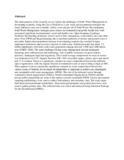| dc.description.abstract | The main purpose of the research was to explore the challenges of Solid Waste Management in developing countries, using the City of Nairobi as a case study and recommend strategies the future initiatives may use to handle, collect, store and get rid of Solid Waste.The inadequate Solid Waste Management strategies pose serious environmental and public health risks with associated significant environmental, social and health costs. Open dumping of garbage facilitates the breeding of disease vectors such as flies, mosquitoes, cockroaches, rats, and other pests. Poor SWM and illegal dumping sites exacerbate pollution of surface and ground water is prevalent. Rapid urban population increase in developing countries has resulted in large unplanned settlements and excessive amount of solid waste. Nairobi presently has about 3.2 million inhabitants with daily solid waste generation ranging between 1,900 and 2,400 metric tons (UNEP, 2010). The main challenges facing waste management include inadequate financing, poor infrastructure and technology, lack of public awareness on good sanitary practices, inadequate legal and regulatory.
The overall average composition of waste at source was estimated to be 51% Organic Fraction (OF), 38% recyclable (paper, plastic, glass and metal) and 11 % residual. There is a significant variation in waste composition between the different types of generators, with the organic fraction in residential waste at source being as high as 60%. There appears to be no statistically significant variation in waste composition between the various zones of Nairobi. Involvement of stakeholders is important to achieve any meaningful and sustainable solid waste management (SWM). The role of the informal sector through community-based organizations (CBOs), NonGovernmental Organizations (NGOs) and the private public partnership are some of the options towards sustainable SWM. Cluster and random sampling methodology were used to collect both primary and secondary data. The study target individual and institutional stakeholders. Structured questionnaires and guided interviews were used to gather primary data. The collected data was coded and analyzed using Statistical Package for the SociaISciences(SPSS). | en_US |

